初二英语第七讲:期中复习
- 格式:docx
- 大小:43.78 KB
- 文档页数:9
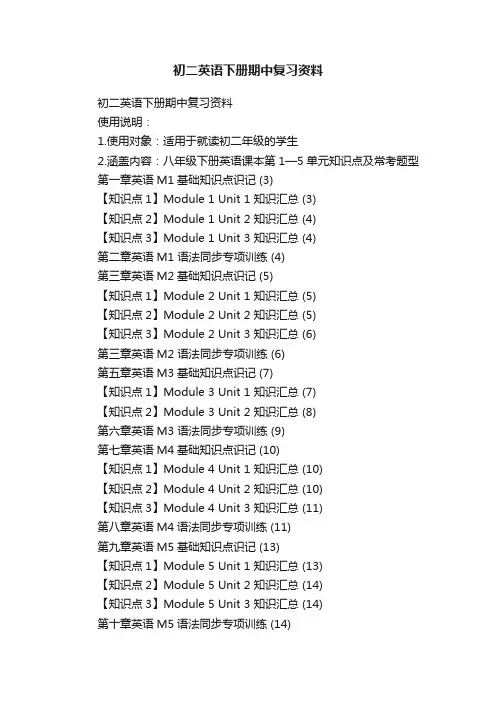
初二英语下册期中复习资料初二英语下册期中复习资料使用说明:1.使用对象:适用于就读初二年级的学生2.涵盖内容:八年级下册英语课本第1—5单元知识点及常考题型第一章英语M1基础知识点识记 (3)【知识点1】Module 1 Unit 1 知识汇总 (3)【知识点2】Module 1 Unit 2 知识汇总 (4)【知识点3】Module 1 Unit 3 知识汇总 (4)第二章英语M1 语法同步专项训练 (4)第三章英语M2基础知识点识记 (5)【知识点1】Module 2 Unit 1 知识汇总 (5)【知识点2】Module 2 Unit 2 知识汇总 (5)【知识点3】Module 2 Unit 3 知识汇总 (6)第三章英语M2 语法同步专项训练 (6)第五章英语M3基础知识点识记 (7)【知识点1】Module 3 Unit 1 知识汇总 (7)【知识点2】Module 3 Unit 2 知识汇总 (8)第六章英语M3 语法同步专项训练 (9)第七章英语M4基础知识点识记 (10)【知识点1】Module 4 Unit 1 知识汇总 (10)【知识点2】Module 4 Unit 2 知识汇总 (10)【知识点3】Module 4 Unit 3 知识汇总 (11)第八章英语M4语法同步专项训练 (11)第九章英语M5基础知识点识记 (13)【知识点1】Module 5 Unit 1 知识汇总 (13)【知识点2】Module 5 Unit 2 知识汇总 (14)【知识点3】Module 5 Unit 3 知识汇总 (14)第十章英语M5语法同步专项训练 (14)第一章英语M1基础知识点识记【知识点1】Module 1 Unit 1 知识汇总1. smell【用法】v. 闻.来,感.动.,.当.动.,后跟形容词,无进行时态和被动语态。
【拓展】其.的.官.词.有:look看.来,taste 尝.来,feel 摸.来,sound 听.来2. What a delicious smell!【用法】感叹句语法一、感叹句用法:表示说话人的强烈的感情。
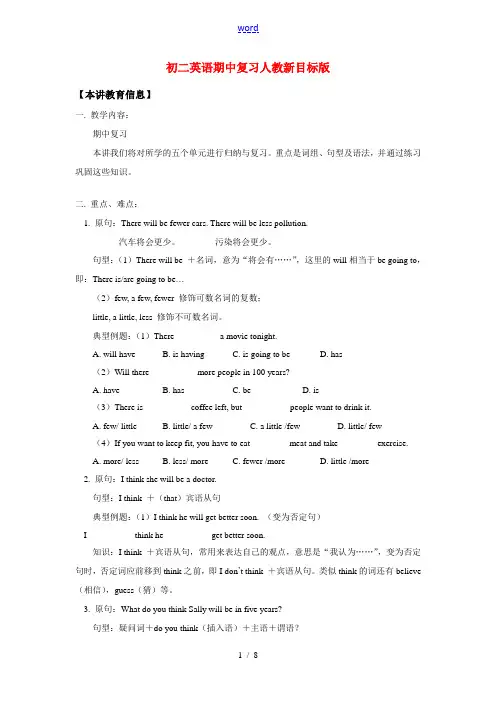
初二英语期中复习人教新目标版【本讲教育信息】一. 教学内容:期中复习本讲我们将对所学的五个单元进行归纳与复习。
重点是词组、句型及语法,并通过练习巩固这些知识。
二. 重点、难点:1. 原句:There will be fewer cars. There will be less pollution.汽车将会更少。
污染将会更少。
句型:(1)There will be +名词,意为“将会有……”,这里的will相当于be going to,即:There is/are going to be…(2)few, a few, fewer 修饰可数名词的复数;little, a little, less 修饰不可数名词。
典型例题:(1)There __________a movie tonight.A. will haveB. is havingC. is going to beD. has(2)Will there __________ more people in 100 years?A. haveB. hasC. beD. is(3)There is __________ coffee left, but __________ people want to drink it.A. few/ littleB. little/ a fewC. a little /fewD. little/ few(4)If you want to keep fit, you have to eat ________ meat and take ________ exercise.A. more/ lessB. less/ moreC. fewer /moreD. little /more2. 原句:I think she will be a doctor.句型:I think +(that)宾语从句典型例题:(1)I think he will get better soon. (变为否定句)I __________ think he __________ get better soon.知识:I think +宾语从句,常用来表达自己的观点,意思是“我认为……”,变为否定句时,否定词应前移到think之前,即I don’t think +宾语从句。
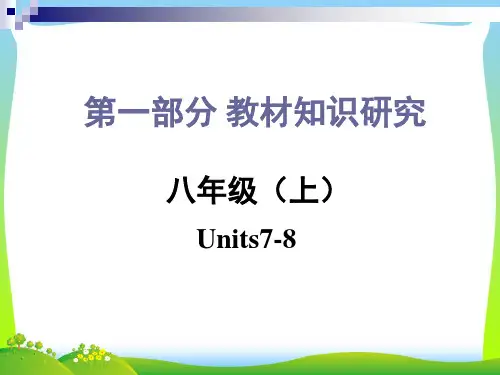
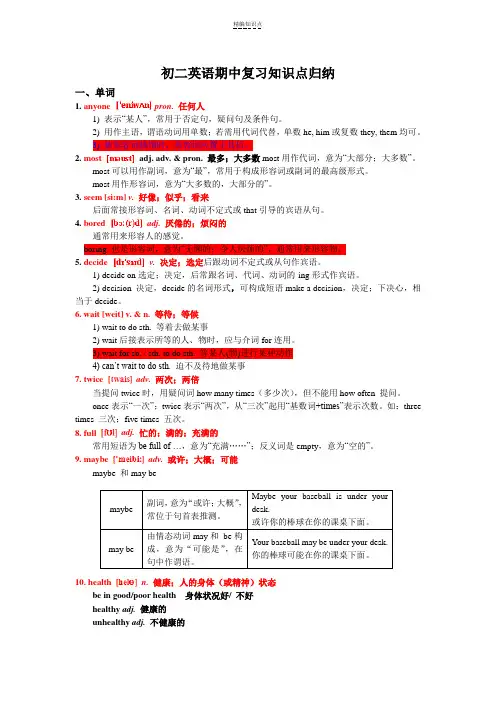
初二英语期中复习知识点归纳一、单词1.anyone pron. 任何人1) 表示“某人”,常用于否定句,疑问句及条件句。
2) 用作主语,谓语动词用单数;若需用代词代替,单数he, him或复数they, them 均可。
3) 被形容词修饰时,形容词应置于其后。
2. most adj. adv. & pron. 最多;大多数most 用作代词,意为“大部分;大多数”。
most 可以用作副词,意为“最”,常用于构成形容词或副词的最高级形式。
most 用作形容词,意为“大多数的,大部分的”。
3.seem [si:m] v. 好像;似乎;看来后面常接形容词、名词、动词不定式或that 引导的宾语从句。
4. bored adj. 厌倦的;烦闷的通常用来形容人的感觉。
boring 也是形容词,意为“无聊的;令人厌烦的”,通常用来形容物。
5. decide v. 决定;选定后跟动词不定式或从句作宾语。
1) decide on 选定;决定,后常跟名词、代词、动词的-ing 形式作宾语。
2) decision 决定,decide 的名词形式,可构成短语make a decision ,决定;下决心,相当于decide 。
6. wait [weit] v. & n. 等待;等候1) wait to do sth. 等着去做某事2) wait 后接表示所等的人、物时,应与介词for 连用。
3) wait for sb. / sth. to do sth. 等某人(物)进行某种动作 4) can’t wait to do sth. 迫不及待地做某事 7. twice adv. 两次;两倍当提问twice 时,用疑问词how many times (多少次),但不能用how often 提问。
once 表示“一次”;twice 表示“两次”,从“三次”起用“基数词+times”表示次数。
如:three times 三次;five times 五次。
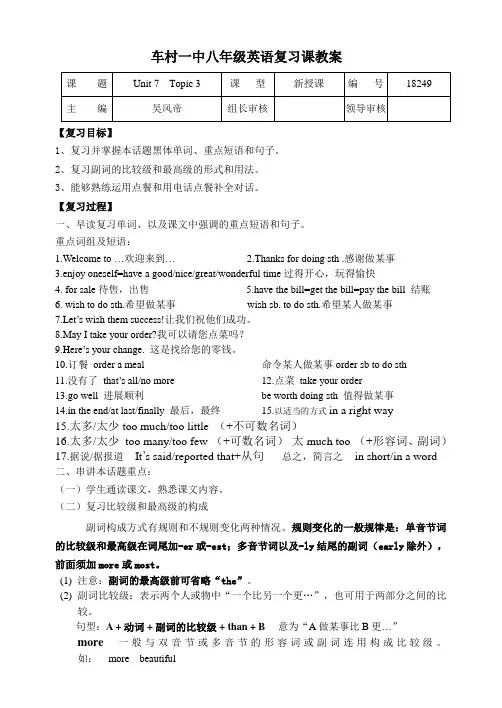
车村一中八年级英语复习课教案【复习目标】1、复习并掌握本话题黑体单词、重点短语和句子。
2、复习副词的比较级和最高级的形式和用法。
3、能够熟练运用点餐和用电话点餐补全对话。
【复习过程】一、早读复习单词、以及课文中强调的重点短语和句子。
重点词组及短语:1.Welcome to …欢迎来到…2.Thanks for doing sth .感谢做某事3.enjoy oneself=have a good/nice/great/wonderful time过得开心,玩得愉快4. for sale待售,出售5.have the bill=get the bill=pay the bill 结账6. wish to do sth.希望做某事wish sb. to do sth.希望某人做某事7.Let’s wish them success!让我们祝他们成功。
8.May I take your order?我可以请您点菜吗?9.Here’s your change. 这是找给您的零钱。
10.订餐order a meal 命令某人做某事order sb to do sth11.没有了that’s all/no more 12.点菜take your order13.go well 进展顺利be worth doing sth 值得做某事14.in the end/at last/finally 最后,最终15.以适当的方式in a right way15.太多/太少too much/too little (+不可数名词)16.太多/太少too many/too few (+可数名词)太much too (+形容词、副词)17.据说/据报道It’s said/reported that+从句总之,简言之in short/in a word二、串讲本话题重点:(一)学生通读课文,熟悉课文内容。
(二)复习比较级和最高级的构成副词构成方式有规则和不规则变化两种情况。
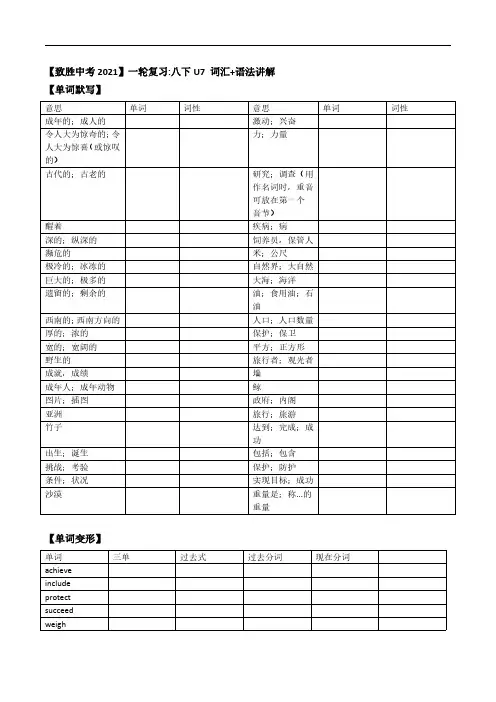
【致胜中考2021】一轮复习:八下U7词汇+语法讲解【单词默写】意思单词词性意思单词词性成年的;成人的激动;兴奋力;力量令人大为惊奇的;令人大为惊喜(或惊叹的)古代的;古老的研究;调查(用作名词时,重音可放在第一个音节)醒着疾病;病深的;纵深的饲养员,保管人濒危的米;公尺极冷的;冰冻的自然界;大自然巨大的;极多的大海;海洋遗留的;剩余的油;食用油;石油西南的;西南方向的人口;人口数量厚的;浓的保护;保卫宽的;宽阔的平方;正方形野生的旅行者;观光者成就,成绩墙成年人;成年动物鲸图片;插图政府;内阁亚洲旅行;旅游竹子达到;完成;成功出生;诞生包括;包含挑战;考验保护;防护条件;状况实现目标;成功沙漠重量是;称...的重量【单词变形】单词三单过去式过去分词现在分词achieveincludeprotectsucceedweigh单词复数单词复数单词复数achievement research squareadult keeper touristartwork meter wallcondition nature whalebamboo ocean governmentdesert oil tourchallenge单词比较级最高级单词比较级最高级amazing thickdeep wide【单词变性】amazing形容词变动词__________________awake形容词变动词__________________deeply副词变形容词__________________endangered形容词变动词__________________freezing形容词变动词__________________remaining形容词变动词__________________wide形容词变副词__________________achievement名词变动词__________________Asia名词变形容词__________________condition名词变形容词__________________illness名词变形容词__________________keeper名词变动词__________________nature名词变形容词__________________protection名词变动词__________________succeed动词变名词__________________【一词多义】1.square______________________________The old house where he used to live is about99square meters in size.Tian’an men Square lies in Beijing.【词汇用法】1.awake:adj./be awake近义词辨析:awake vs.wakeawake:adj./be awakewake:v./wake sb.up/wake up sb.以a开头的形容词vs.不以a开头的形容词asleep vs.sleepyalone vs.lonelyalive vs.livingashamed vs.shamed2.birth:n./at birth/give birth to sb.3.excitement:n./with excitement/in excitement4.population:n./the number of population/a large population/a small population/What’s the population of5.wall:n./put up sth.on the wall/go through the wall/against the wall6.achieve:v./achieve sth./achieve one’s dream近义词辨析:realize vs.achieve e outrealize:v./realize one’s dream/realize that…achieve:v./achieve one’s dream/achieve sth.come out:v./dream come out7.protect:v./protect sb./protect sb.(from)doing sth.相关词辨析:protect:v./protect sb./protect sb.(from)doing sth.keep:v./keep sth./keep sb.from doing sth.prevent:v./prevent sb.(from)doing sth.stop:v./stop sb.(from)doing sth.8.succeed:v./succeed in doing sth.9.weigh:vt./weigh sth./vi./sth.weighs+重量【高频短语】endangered animals___________________ at birth___________________ give birth to___________________in good condition___________________ with excitement___________________【词汇练习】1.Teenagers need to work hard to a________their dream as everything is to be earned.2.Getting good grades through hard work will give you a feeling of a great a________.3.Don’t worry too much about your son.He is not a kid but an a________now.4.Paper is one of the four great inventions made by a________Chinese people.5.I always keep myself a________at night by drinking coffee.6.The water in this area is d________than that area for kids.7.The Sahara is larger than any other d________in the world.8.The spirit of these climbers shows that human can sometimes be stronger than the f________of nature.9.Our g________has decided to take actions to control some serious pollution.10.The price of the hotel i________breakfast.So you don’t have to pay for it.11.She always wanted to sail across the Pacific O________.12.Fifty years ago,the world p__________was smaller and there was more fresh water available per personthan there is now today.13.The old house where he used to live is about99s________meters in size.14.Bell didn’t invent the telephone overnight.He s________by trying many times.15.It’s really difficult to climb Qomolangma because t________clouds cover the top and snow can fall veryhard.16.G20is just around the corner,millions of t________will come to Hangzhou after that.17.Badaling is part of the Ming Great W________.18.He w________the watermelons in his hand and chose the heaviest one.19.The river is about six miles w________and one hundred miles long.20.People should do something to protect the w________animals so that there won‘t be fewer and fewer ofthem on the earth.【参考答案】意思单词词性意思单词词性成年的;成人的adult adj.激动;兴奋excitement n.amazing adj.力;力量force n.令人大为惊奇的;令人大为惊喜(或惊叹的)research n.&v.古代的;古老的ancient adj.研究;调查(用作名词时,重音可放在第一个音节)醒着awake adj.疾病;病illness n.深的;纵深的deep adj.饲养员,保管人keeper n.濒危的endangered adj.米;公尺meter n.极冷的;冰冻的freezing adj.自然界;大自然nature n.巨大的;极多的huge adj.大海;海洋ocean n.oil n.遗留的;剩余的remaining adj.油;食用油;石油西南的;西南方向的southwestern adj.人口;人口数量population n.厚的;浓的thick adj.保护;保卫protection n.宽的;宽阔的wide adj.平方;正方形square n.野生的wild adj.旅行者;观光者tourist n.成就,成绩achievement n.墙wall n.成年人;成年动物adult n.鲸whale n.图片;插图artwork n.政府;内阁government n.亚洲Asia n.旅行;旅游tour n.&v.achieve v.竹子bamboo n.达到;完成;成功出生;诞生birth n.包括;包含include v.挑战;考验challenge n.保护;防护protect v.条件;状况condition n.实现目标;成功succeed v.weigh v.沙漠desert n.重量是;称...的重量【单词变形】单词三单过去式过去分词现在分词achieve achieves achieved achieved achievementinclude includes included included includingprotect protects protected protected protectingsucceed succeeds succeeded succeeded succeedingweigh weighs weighed weighed weighing单词复数单词复数单词复数achievement achievements research researches square squares adult adults keeper keepers tourist tourists artwork artworks meter meters wall walls condition conditions nature/whale whales bamboo bamboos ocean oceans government governments desert deserts oil/tour/ challenge challenges单词比较级最高级单词比较级最高级amazing more amazing most amazing thick thicker thickest deep deeper deepest wide wider widest【单词变性】amazing形容词变动词amazeawake形容词变动词wakedeeply副词变形容词deependangered形容词变动词endangerfreezing形容词变动词freezeremaining形容词变动词remainwide形容词变副词widelyachievement名词变动词achieveAsia名词变形容词Asiancondition名词变形容词conditionalillness名词变形容词illkeeper名词变动词keepnature名词变形容词naturalprotection名词变动词protectsucceed动词变名词success【一词多义】1.square平方广场The old house where he used to live is about99square meters in size. Tian’an men Square lies in Beijing.【高频短语】endangered animals濒危动物at birth出生时give birth to给某人生命in good condition在好的条件下with excitement兴奋地【词语练习】Achieve achievement adult ancient awake deeper desert force government includes Ocean population square succeeded thick tourists Wall weighed wide wild。
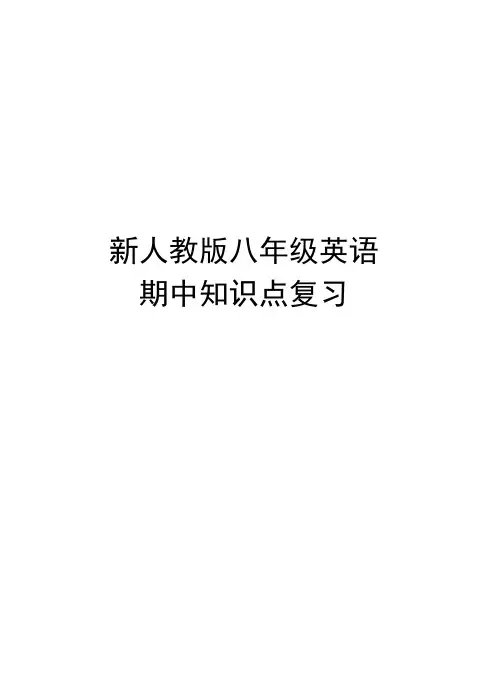
新人教版八年级英语期中知识点复习八年级下册英语知识点总结(期中版)1. 询问对方身体状况的表达方式:What's wrong (with sb./sth.)?=what's the matter (with sb./sth.)?=wha'ts the trouble (with sb./sth.)?=what's the problem (with sb./sth.)?2. 身体部位疼痛的表达方式:sb.+have/has a 身体部位--ache(疼痛)eg.Bob has a headache.Sb.+have/has a +sore身体部位eg.Alice has a sore back.身体部位+is/are+sore eg.My throat is sore now.身体部位+hurt(s) eg. My brother's left leg hurts.3. too much +不可数名词太多。
too many + 可数名词复数太多。
Much too +形容词或者副词的原级太。
4. enough足够(形容词/副词)修饰名词做定语时既可以放在被修饰词的前面也可放在后面但是做副词修饰动词、形容词、副词时智能放在被修饰词后5. for too long = for a long time6. Need to do sth.需要去做某事7. At the foot of .. 在。
脚下/底部8. Have/take a test =have/take a break=have/take brea休息一下9. Get o n(+较大的交通工具) 上车get in to(+较小交通工具)上车/进入。
10. Get off下车get out of下车/从。
下来11. Expect sb. To do sth期望某人做某事12.See sb.doi ng sth看见某人正在做某事13. agree to do sth同意去做某事14. Ask sb.sth询问某人某事15. Have problems( in) doing sth.=have trouble doing sth.=have difficulty doing sth 做某事有困难16. Thanks to ... 多. 亏,由于17. Right away=at once 立刻,马上18.Sth.happe ns to sb某人发生某事19.Sb.happe ns to do sth某人碰巧做某事20. To one's surprise让某人惊讶的是。
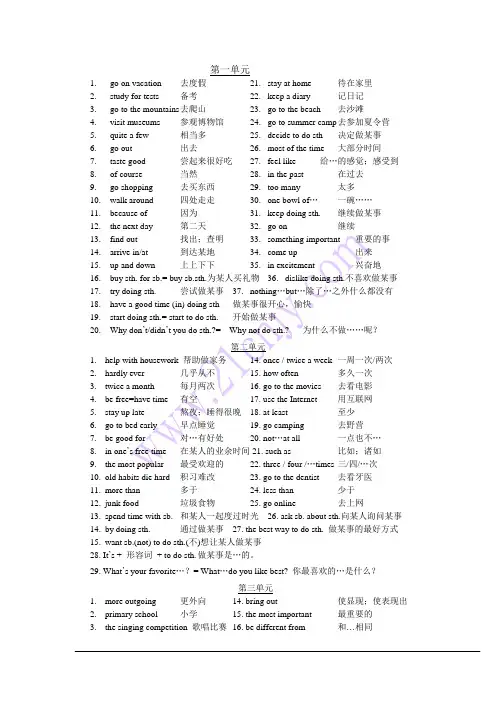
第一单元1.go on vacation 去度假21. stay at home 待在家里2.study for tests 备考22. keep a diary 记日记3.go to the mountains 去爬山23. go to the beach 去沙滩4.visit museums 参观博物馆24. go to summer camp 去参加夏令营5.quite a few 相当多25. decide to do sth 决定做某事6.go out 出去26. most of the time 大部分时间7.taste good 尝起来很好吃27. feel like 给…的感觉;感受到8.of course 当然28. in the past 在过去9.go shopping 去买东西29. too many 太多10.walk around 四处走走30. one bowl of…一碗……11.because of 因为31. keep doing sth. 继续做某事12.the next day 第二天32. go on 继续13.find out 找出;查明33. something important 重要的事14.arrive in/at 到达某地34. come up 出来15.up and down 上上下下35. in excitement 兴奋地16.buy sth. for sb.= buy sb.sth.为某人买礼物36. dislike doing sth.不喜欢做某事17.try doing sth. 尝试做某事37. nothing…but…除了…之外什么都没有18.have a good time (in) doing sth 做某事很开心,愉快19.start doing sth.= start to do sth. 开始做某事20.Why don’t/didn’t you do sth.?= Why not do sth.? 为什么不做……呢?第二单元1.help with housework 帮助做家务14. once / twice a week 一周一次/两次2.hardly ever 几乎从不15. how often 多久一次3.twice a month 每月两次16. go to the movies 去看电影4.be free=have time 有空17. use the Internet 用互联网5.stay up late 熬夜;睡得很晚18. at least 至少6.go to bed early 早点睡觉19. go camping 去野营7.be good for 对…有好处20. not…at all 一点也不…8.in one’s free time 在某人的业余时间21. such as 比如;诸如9.the most popular 最受欢迎的22. three / four /…times 三/四/…次10.old habits die hard 积习难改23. go to the dentist 去看牙医11.more than 多于24. less than 少于12.junk food 垃圾食物25. go online 去上网13.spend time with sb. 和某人一起度过时光26. ask sb. about sth.向某人询问某事14.by doing sth. 通过做某事27. the best way to do sth. 做某事的最好方式15.want sb.(not) to do sth.(不)想让某人做某事28. It’s + 形容词+ to do sth. 做某事是…的。
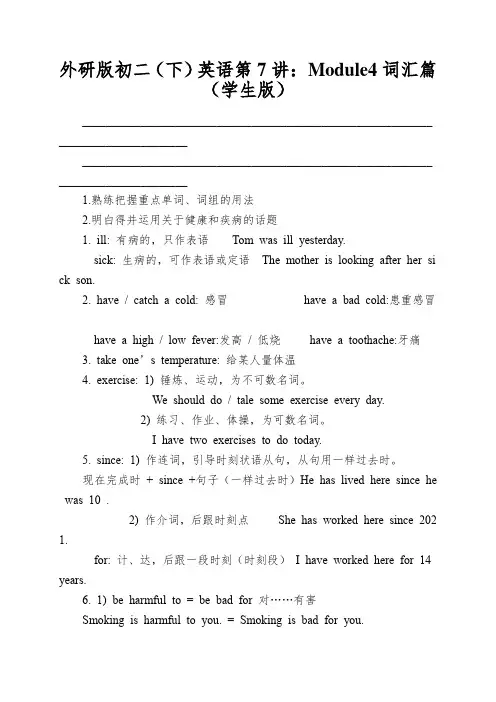
外研版初二(下)英语第7讲:Module4词汇篇(学生版)____________________________________________________________ __________________________________________________________________________________ ______________________1.熟练把握重点单词、词组的用法2.明白得并运用关于健康和疾病的话题1. ill: 有病的,只作表语Tom was ill yesterday.sick: 生病的,可作表语或定语The mother is looking after her si ck son.2. have / catch a cold: 感冒have a bad cold:患重感冒have a high / low fever:发高/ 低烧have a toothache:牙痛3. take one’s temperature: 给某人量体温4. exercise: 1) 锤炼、运动,为不可数名词。
We should do / tale some exercise every day.2) 练习、作业、体操,为可数名词。
I have two exercises to do today.5. since: 1) 作连词,引导时刻状语从句,从句用一样过去时。
现在完成时+ since +句子(一样过去时)He has lived here since he was 10 .2) 作介词,后跟时刻点She has worked here since 202 1.for: 计、达,后跟一段时刻(时刻段)I have worked here for 14 years.6. 1) be harmful to = be bad for 对……有害Smoking is harmful to you. = Smoking is bad for you.2) It’s harmful to do sth.: 做某事是有害的It’s harmful to read in the sun.7. active: adj. 积极的、活跃的8. by: 介词,通过by doing sth.:通过某个方式My sister learns English by listening to English songs.9. take part in = join in 参加活动join in the discussion / the sport s meetingjoin: 加入党派、团体、组织,成为其中一员join the army / the Partyjoin sb. in sth. / doing sth.: Will you join us in playing basketbal l?10. be in excellent condition: 健康状况专门好be in trouble:处于逆境11. sleepy adj. 欲睡的、想睡的I often feel sleepy in class.asleep adj. 睡着的、睡熟的fall asleep:入睡、睡着12. weak: 虚弱的、弱的。
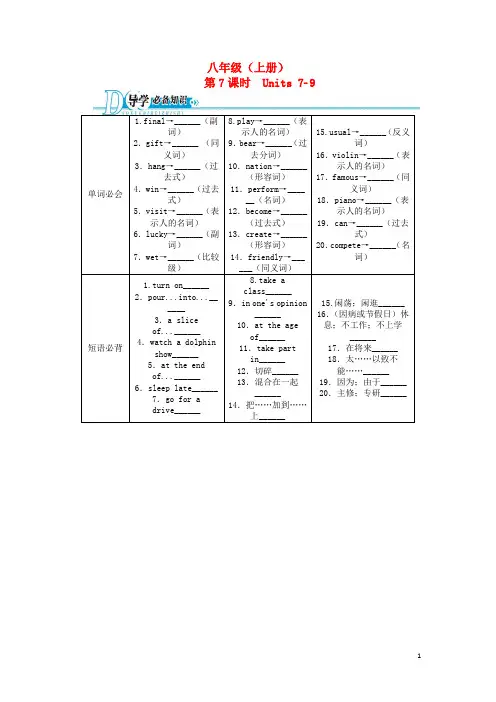
八年级(上册)第7课时Units 79单词必会1.final→______(副词)2.gift→______ (同义词)3.hang→______(过去式)4.win→______(过去式)5.visit→______(表示人的名词)6.lucky→______(副词)7.wet→______(比较级)8.play→______(表示人的名词)9.bear→______(过去分词)10.nation→______(形容词)11.perform→______(名词)12.b ecome→______(过去式)13.create→______(形容词)14.friendly→______(同义词)ual→______(反义词)16.violin→______(表示人的名词)17.famous→______(同义词)18.piano→______(表示人的名词)19.can→______(过去式)20.compete→______(名词)短语必背1.turn on______2.pour...into...______3.a sliceof...______4.watch a dolphinshow______5.at the endof...______6.sleep late______7.go for adrive______8.take aclass______9.in one's opinion______10.at the ageof______11.take partin______12.切碎______13.混合在一起______14.把……加到……上______15.闲荡;闲逛______16.(因病或节假日)休息;不工作;不上学______17.在将来______18.太……以致不能……______19.因为;由于______20.主修;专研______句型在线1.How do you make a bananamilk shake?________________________________________________________________________2.Pour the milk into theblender.________________________________________________________________________3.Here's a recipe for a greatturkey sandwich!________________________________________________________________________4.How was your day off?________________________________________________________________________5.When was he born?________________________________________________________________________6.——我们需要多少酸奶?——我们需要一杯子酸奶。
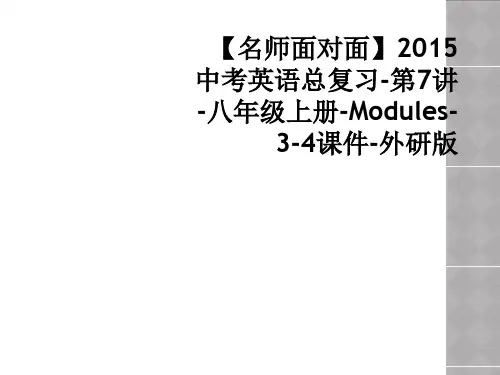
教育1对3辅导讲义1、上次课后巩固作业复习;2、互动探索教学意见:带领同学们完成上节课的预习思考,并组织学生展开时态的总结讨论。
请看下面的时间轴,英文中常用的几大时态你能区分清楚吗?能不能用耳熟能详的歌曲给大家演绎一下?范例:We Will Rock You 摇滚万岁-Buddy, you're a boy make a big noisePlaying in the streets gonna be a big man someday You got mud on your faceYou big disgraceKicking your can all over the placeSingingWe will, we will rock youWe will, we will rock youBuddy you're a young man, hard manShouting in the street gonna take on the world someday You got blood on your faceYou big disgraceWaving your banner all over the placeWe will, we will rock youSingingWe will, we will rock you【知识梳理1】时态时态常用时间状语备注一般现在时often, always, usually, sometimes, every**, once a week一般过去时just now, yesterday**, last **, in**, **ago主将从现:when, after, before, untitill, as soon as, if, as long as一般将来时tomorrow**, next**, **later, in**, soon, the day aftertomorrow.过去将来时常用于宾语从句和间接引语中.现在进行时now, nowadays, at the moment过去进行时this time yesterday, at eleven yesterday morning, at that time, at the moment 常考点:B was doing sth when A d sth. else.现在完成时for + 时间段; since + 时间点, lately, recently, just, already, yet, ever, never, before, up to now/the present, till now, so far,these days, in the past few years 用法辨析:have been to, have been have gone to,have been in持续性动词: be, have, keep过去完成时by +过去时间点(eg. by 2019, by the time he was born)【巩固练习】1. When I_________ the cinema, the film_________ for ten minutes.A. got to... has begunB. arrived at... has been onC. reached. .had begunD. hurried to.. .had been on2. People _________ a lot of trees on the countryside by the end of last month.A .plantB plantedC have plantedD had planted3. ---Hi, guys. Where are you going now?---Home. We_________ all our money, so we have to walk home now.A spendB spentC have spentD are spending4. I_________ TV when the earthquake happened in Shanghai half a month ago.A. watch B watched C .was watching D had watched5. When the 62-meter Shanghai Tower_________, it will be the second tallest building in the world.A finishesB finishedC will finishD is finishedKeys:DDCCD【知识梳理2】名词修饰词【巩固练习】1. People waste _________ electricity every day. It’s time to take action.A. a large number of B) huge amounts of C. many D. quite a lot2. Twenty people died and over _________ were injured in the accident.A. hundredB. hundred ofC. a hundredD. hundreds of3.After moving to their new house, the Lees bought some _________ in the mall nearby.A. furnitureB. chairC. tableD. shelf4.You can get much_________ about the World Expo on the Internet.A. mapB. pictureC. ticketD. information5.The customers are pleased with the_________ of the restaurant.A. balanceB. experienceC. surfaceD. serviceKeys: BCADD【知识梳理3】情态动词情态动词问答形式考点备注can/could Can I…?can’t 表示否定猜测--Yes, you can/No, you can’t.may/might May I…?may 表示语气较弱的猜测--Yes, please--No, you can’t/mustn’tmust/have to/need Must I…?--Yes, you must.--No, you needn’t/don’t have to.must表示肯定猜测need Need I…?--Yes, you must.--No, you needn’t.肯定:need to do sth.need sth.否定:don’t need to do sth.don’t need sth.needn’t do sth.【巩固练习】1. --Must we finish the poster in class?---No, you_________. You can finish it after class.A.Mustn’t B. needn’t C. shouldn’t D. can’t2. Tom, you mustn't play with fire. You _________ hurt yourself if you don't stop.A. mayB. canC. shouldD. need to3. Only you _________ do such a thing, I'm sure, and nobody else has such an ability.A. mustB. shouldC. mayD. can4. It _________ be fantastic if more students join in the charity show tomorrow.A. mustB. needC. canD. may5. Every citizen _________try his best to protect our environment. It’s our duty.A. needB. mustC. canD. mayKeys: BADAB【知识梳理4】宾语从句宾语从句3要素教学建议:此部分必须由班级学员合作完成。
人教版初中英语八年级英语上册Unit7期中期末精品复习教案学案Unit 7 Will people have robots?一、知识点1. live to be 200 years old 活动200岁2. in the future 在未来3. world peace 世界和平4. live in an apartment 住在公寓里5. look for 寻找5. on a space station 在太空站6. in space 在太空7. seem impossible 似乎不可能8. human servants 人类的仆人 9. think like a human/humans 像人类一样思考10. over and over again 反复地 11.pollute the environment 污染环境12. on the earth 在地球上 13. the meaning(s) of words 单词的意思 14. in the sea. 在海洋15. another foreign language 另一门外语 16. move to other planets. 搬到其他的星球去17. in the sky. 在空中 18. in danger 处于危险之中 18. during the week 在这周之内19. out of danger 脱离危险 20. at some point 在某一点上;在某种程度上;在某个时候 21. Books will only be on computers, not on paper. 书将只在电脑里, 而不是在纸上。
(u.n)纸: a piece of paper 一张纸The paper is too small. Could you give me a big piece ?(c.n)试卷;论文;报纸: The students are busy doing their papers.22. There will be more pollution. 将会有更多的污染。
人教版中考英语一轮复习第七讲八年级(上)Units 7-8教学设计一. 教材分析人教版初中英语八年级上册第七、八单元涉及了多种日常生活中的情境,如购物、天气、节日等,内容贴近学生的生活实际。
这两个单元的主要语言点包括一般现在时态、现在进行时态、一般过去时态和一般将来时态,以及相应的疑问词和否定句型。
本节课将围绕这些语言点展开教学,通过让学生充分接触、理解和运用语言,提高他们的语言运用能力。
二. 学情分析学生在进入八年级之前已经学习过一定量的英语词汇和语法知识,对日常交流的基本句型和常用表达有一定的了解。
然而,他们在语言运用方面还存在一定的问题,如语法运用不准确、词汇搭配不当等。
因此,在教学过程中,需要关注学生的个体差异,针对不同水平的学生给予适当的指导。
三. 教学目标1.知识目标:学生能够掌握第七、八单元的重点词汇、句型和语法点;2.能力目标:学生能够熟练运用一般现在时态、现在进行时态、一般过去时态和一般将来时态描述日常生活中的情境;3.情感目标:激发学生学习英语的兴趣,培养他们的合作意识和跨文化交际意识。
四. 教学重难点1.重点:第七、八单元的重点词汇、句型和语法点;2.难点:一般过去时态和一般将来时态的运用,以及相应的疑问词和否定句型。
五. 教学方法1.情境教学法:通过设定各种日常生活中的情境,让学生在实际语境中学习、运用英语;2.交际教学法:鼓励学生进行小组合作,进行角色扮演、互动问答等实践活动,提高他们的口语表达能力;3.任务型教学法:设计各种任务,让学生在完成任务的过程中运用所学知识,提高他们的综合语言运用能力。
六. 教学准备1.教材:人教版初中英语八年级上册;2.辅助材料:PPT、图片、卡片、实物等;3.教学设备:投影仪、电脑、音响等。
七. 教学过程1.导入(5分钟)利用图片或实物引导学生复习第七、八单元的重点词汇,激发学生的学习兴趣。
2.呈现(10分钟)通过PPT展示第七、八单元的主要句型和语法点,引导学生理解和掌握。
年级初二学科英语版本人教版(新目标)课程标题初二英语人教版(新目标)下学期期中复习编稿老师康文岗一校林卉二校黄楠审核王宝丹一、学习目标:1、知识目标:掌握本讲的词汇、短语、句型和语法。
2、情感目标:帮助同学们在考前进行有针对性的复习,增强自信心,沉着迎接考试。
二、重点、难点:重点:复习下册Units1-5中的重点单词、短语。
难点:语法:1. 直接引语与间接引语2. 条件状语从句三、知能提升:(一)重点单词[单词复习]1. less与fewerless是little的比较级,修饰不可数名词;fewer是few的比较级,修饰可数名词。
I hope there are cars and pollution in our city.A. fewer, lessB. fewer, fewerC. less, lessD. less, fewer2. alone 与lonelyalone 副词,意为“单独地;独自地”,形容词,意为“单独的;独自的”;lonely形容词,意为“孤独的;寂寞的”。
①The old man lives , but he doesn’t feel .A. alone, aloneB. lonely, lonelyC. alone, lonelyD. lonely, alone②You must not go there (单独地). It’s dangerous.3. can 与be able to二者既可表示泛指的能力,也用来指具体的能力,有时可互换。
Tom can/is able to swim. 汤姆会游泳。
can 只能用于现在时、过去时中;而be able to可以用于各种时态。
—Why do you want to be a lawyer?—If I become a lawyer, I help people.A. will canB. am able toC. was able toD. will be able to4. besides 与exceptbesides 意为“除……外,还有……(包括)”,表示一种累加关系;except意为“除……外,不再有……(不包括)”,表示一种排除关系。
⼈教版⼋年级英语上册units7-9复习教案⼋年级上Unit 7-9复习教案复习⽬标:1.复习⼋年级下册units7-9的所有单词,熟练掌握各单元中的加粗单词、重点短语、重点句⼦;熟练运⽤⼀般将来时态, 制作⾷品的步骤及其应对邀请的委婉表达。
2.复述三个单元中的2a&2b,掌握3a和Reading的篇章逻辑结构、话题和功能;根据关键词复述3a和Reading。
3.结合学习和⽣活的实际,参考unit7 的语⾔结构,仿写⼀篇“My life in ten years”为话题的短⽂,长度接近3a。
4.查缺补漏,巩固units7-9的所学内容。
5.学会委婉地提出请求,表达建议。
养成⽂明的⾏为习惯。
(设计意图:⽬标引领,逐条表述出本节课的知识、能⼒和情感⽬标,使本节课的内容明朗,便于学⽣有⽬的的学习。
)。
⾃主复习内化⼀、根据下列汉语默写单词。
(⼀)根据词形变化默写单词:1. 污染___________(v. ) __________ (n.)污染/ __________ (adj)污染2. 预⾔,预测__________ (v. ) __________ (n.) 预⾔,预测3. 和平________(n. ) __________ (adj.) 和平的4. 服务__________ (n. ) ____________(n.)仆⼈__________服务(v)__________5.危险_________(n. ) ____________(adj.) 危险的6. 同意____________(v.) _____________(n.) 同意_______________反义词(反义词)___________(adj.)7.可能的(adj)___________ ____________(adj.)不可能的8. ____________(adj.) 最后_____________(adv)最后9. ⾷盐___________(n.) ____________ (adj .) 咸的10. 传统________ (n.) _____________(adj)传统的11. 旅游(v)___________ 游客(n)__________12. 邀请_________(v.) _____________ (n.) 请柬13. 悲伤的__________ (adj.) ______________(n.) 悲伤,难过14. 准备__________ (v.) ______________(n.) 准备,准备⼯作(⼆)根据词性分类默写单词:名词: 1.污染________ 2.环境_________ 3.⾏星________4.公寓套房_________5.⼈的________6.⼯⼚________7. 形状,外形_________ 8.假期,假⽇_________ 9.酸奶_________10.蜂蜜_________ 11.西⽠_________ 12.糖_________ 13 奶酪_____________14 机器__________ 15 三明治__________ 16 秋天_____________17 温度________________ 18 考试___________19 邀请,请柬______________20 准备________________ 21 胶⽔_______________ 22 ⾳乐会______________23 客⼈_______________ 24 ⽇历_____________- 25 ⼤事______________26 校长_______________动词: 1. 污染_________ 2. 种植________ 3. 建筑_________4. 相信____________ 5摇动,抖动___________ 6 倒出__________7剥⽪_____________ 8 庆祝____________9覆盖_______________10 接待______________11 把。
复文教育精品小班课程辅导讲义讲义编号2012秋季08YY07 (学生用)辅导科目:英语年级:初二课题第7讲:期中复习授课时间:2012年10月28日备课时间:2012年10月教学目标复习本学期所学内容,为期中考试做好准备教学重点教学内容一、课前回顾根据汉语意思,将下列句子翻译成英语。
1. 我们每周应该至少打两场篮球。
________________________2. 我们可以用很多不同的方法来解决这个问题。
__________________3. 你知道是谁发明了电脑吗?________________________4. 王飞很聪明,他能够解出这道难题。
______________________5. 这个箱子很重,我移不动它。
________________________6. 我喜欢看一些有关电子音乐的书。
_______________________7. 杰克发现学好数学很难。
(使用形式宾语)______________________8. 没有音乐的话,我感到很压抑。
______________________9. 请给他一杯茶。
(用两种方式表达)______________________10. 我们都在听他那个令人兴奋的故事。
______________________二、知识梳理Units 1—4知识点与中考考点链接1. I live with my parents in the UK.分析:with有多种意思和用法,在初中阶段的学习中主要有以下几种常见意思:(1)具有;带有。
如:China is a country with a long history.(2)用;使用(工具、手段等)。
如:He was writing with a pencil. (3) 与……一道;跟……一起。
如:Harriet is playing with her friend. 在掌握with的用法的同时我们还要知道它的反义词为without。
考点:1) 没有你的帮助我们不能完成这项工作。
We can’t finish the work ______ ______ ______. (09年上海)2) Betty, let’s make a cake ______ some flour, sugar, butter and milk.(08年上海)A. atB. ofC. inD. with2. I am keen on sports.分析:be keen on 是一个固定词组,意为“热衷于”,与be interested in是同义短语。
考点:Steven and William are keen ______ playing computer games. (08年上海)A. toB. withC. onD. at3. Wendy Wang, 15, must be one of the top students in the city.分析:must 是情态动词,后面要接动词原形,此外must be也是一种常见的用法,意为“肯定是”,它的否定结构为can’t be, 意为“肯定不是”,而may be则是“可能是”的意思。
情态动词的用法经常在考试中出现。
must表示对现在发生事情的肯定推测和判断,还可以表示必须做某事,用于否定句时,表示“禁止”。
含有must 的疑问句,否定回答通常用needn’t。
can 则通常用来表示能力。
考点:1) My mother ______ make rice dumplings. She’ll teach me how to do it. (06年上海)A. mustB. needC. shouldD. can2) Students ______ be careful when they do chemical experiments in the lab. (07年上海)A. canB. mustC. needD. may3) —Must I return the magazine to you right now, Sandy?—No, you ______. You may keep it until next Wednesday.(08年上海)A. needn’tB. can’tC. mustD. may4) This Christmas card must ______ from Jim. (09 年上海)A. isB. wasC. beD. are4. I get up at six, wash and put on my school uniform.分析:put on 是“穿(衣服,袜子……)”的意思,强调穿的“动作”,一般不用于表示状态; wear 是“穿着;戴着”的意思,一般用于穿戴这一“状态”。
dress是“为(使)……穿上衣服”的意思, get dressed 表示帮某人穿衣服(强调状态)。
考点:It’s very cold in winter. It’s best ______ warm clothes.(09年上海)A. put onB. to dressC. wearingD. to wearUnits 1—4 正误例析1. 【误】I would like being your pen friend.【正】【析】would like表示意愿,意为“想要”,也可以用would love表示,与want意思相同,但是其语气比want更为婉转,后面接名词或动词不定式。
如:I’d like to drink a cup of coffee. 我想要喝杯咖啡。
2. 【误】Others students often ask me to assist them.【正】【析】other可以作定语,意为“别的;其余的”,后面一般接可数名词复数,相当于others。
而others是other的复数形式,在句中可作主语和宾语,后面不再接名词。
如:Some students cleaned the windows, others mopped the floor. 有的学生擦窗户, 有的擦地板。
3. 【误】Today my dad and I were waiting of the ferry when suddenly we heard a big argument. 【正】【析】wait是动词,意为“等候;等待”,后面通常接介词for。
4. 【误】The man hurried abroad.【正】【析】aboard在这里作副词,意为“上船、车、飞机等”,而abroad则意为“在国外”。
如:My son is still living abroad. 我的儿子仍住在国外。
5. 【误】In ancient time, people wrote numbers in many different ways.【正】【析】我们都知道time是名词,意为“时间”时为不可数名词,而这里则意为“时代;时期”,是可数名词。
6. 【误】This was a very important invention because it made that easier to write big numbers and to calculate.【正】【析】当动词不定式(短语)等在句子中作宾语时,为保持句子结构平衡,避免句式结构的混乱,常用it作形式宾语,而真正的宾语则是后面的不定式结构。
句中划线部分的it就是作形式宾语,指代to write big numbers and to calculate。
三.巩固性训练:PartⅠVocabulary and GrammarI.Choose the best answer.( ) 1. I sometimes go camping with my cousin _____Saturdays and Sundays.A. inB. onC. at D by( )2. A: Do you know ________ girl in red?B: Yes. She is __________university student.A. a …aB. the…anC. the… aD. the( )3. It is raining. Our teacher tells us ___ in the playground.A. don’t runB. not runC. not to run D to not run( )4. Where have you ____________? I couldn’t find you anywhere.A. goneB. beenC. gone toD. been to( )5. Lucy __________a football match on TV in her free time.A. enjoy watchingB. enjoys watchingC. enjoys to watchD. enjoy watch( )6. Our monitor is keen __________pictures.A. to drawB. on drawC. to drawingD. on drawing( )7.It’s better to teach a man fishing than ____ him fish.A. to giveB. givingC. giveD. to giving( )8.A: Would you like to be my pen-friend ?B: _________.A. Y es, I’d love to.B. Yes, I like.C. Yes, I do.D. Yes, I’d like.( )9. Chaplin came into this world in 1889. In this sentence the underlined part means “__________”.A. was bornB. visited the worldC. liked this worldD. wanted to live in this world( )10. Mary never came to school late last term ,__________?A. did sheB. didn’t sheC. did heD. was she( )11.Miss Li is responsible ___________Class Four, Form Eight.A. atB. forC. inD. with( )12. Shanghai is one of __________________ in the world.A. big cityB. bigger cityC. the biggest cityD. the biggest cities( )13. Our class teacher will __________an important meeting tomorrow.A. joinB. take part inC. attendD. join in( )14.Li Ming, when did you _________Shanghai yesterday?A. return toB. return backC. returnD. return in( )15. I don’t think the boy is _______to ______the Army (军队).A. older enough…take part inB. old enough…joinC. enough old…joinD. young enough…attendII.Fill in the blanks with the given words in their proper forms.1.Mr. Smith comes from Europe. He is a ______.( Europe)2.Please help ______________to some meat, children. (you)2.The two girls want to be ___________when they grow up. (act)3.Luxun wrote many _____________novels in his life. (success)4._____________, Li Ming failed the English again. (luck)III.Fill in the blanks with the given words in their proper forms.1.My is hobby ______ (listen ) to music .2.Our English teacher___________(teach) in this school since1998.3.One of Lily’s ambitions is _____(be) an astronaut.4.They____________(cook) supper when Mother came back.5.It __________(rain) twice or three times a month in spring in Shanghai.IV.Find a word or an expression in the box which is the closest in meaning to the underlined part in each sentence.A. ambitionB. very clever teenagerC. getsD. heard fromE. not often1.Tim is a whiz-kid. He can recite 200 poems although he is only five years old.2.I got a letter from my brother last week.3.Our monitor seldom gets to school late.4.My wish is to be an architect.5.The girl often achieves A grades in English.1._________2. ____________3. ___________4._________5. ________V.Rewrite the sentences as required.1.Mary does her homework every day. (改为否定句)Mary _________ ___________ her homework every day2. Jackie was a cook when he lived in France.(基本保持原意)Jackie Chan ___________ _________ a cook when he lived in France.3.It was a very exciting week.(改为感叹句)_______ _______ exciting week it was!4. My brother makes a phone call to me once a week. (对划线部分提问)_________ ________ does your brother make a phone call to you?5. Both of the boy’s parents were doctors. (改为否定句)__________of the boy’s parents __________ a doctor.PartⅡReading and WritingⅠ.Reading comprehension.( A )General Pershing was a great American officer. He was in the American army and fought in Europe in the First World War.After he died, some people in his hometown wanted to remember him, so they put up a big statue (塑像)of him on a horse.There was a school near the statue, and some of the boys went there every day on their way to school and again on their way home. After a few months, some of them began to say “ Good morning, Pershing,” whenever (无论何时) they reached the statue, and soon all the boys at the school were doing this.One Saturday, one of the smallest boys was walking to the shops with his parents. When he went to the statue, he said “ Good morning” to the statue, but then he stopped and said to his parents, “ I like Pershing very much. Mum and Dad, but who is that strange man on his back?”根据短文内容选择正确答案:()1. General Pershing fought in Europe, but he was from ____________.A. EuropeB. EnglandC. AmericaD. American( )2. Some people put a statue of _____________.A. an officerB. General PershingC. a soldierD. both B and C( )3. The statue was ___________the school.A. behindB. not far fromC. inD. very far from( )4. The boys went there every day __________.A. on their way to schoolB. on their way homeC. both A and BD. after class( )5. The boys thought that that ________was Pershing.A. shopB. stoneC. houseD. horse( C )Radio and television are very useful in the world today. They can be seen everywhere. Thousands and thousands of people watch TV. Perhaps even more people listen to the radio. TV is, of course,more useful than radio. On TV you can see and hear what is happening in the world. However radio is not disappearing. It is still with us. And the number of listeners is becoming large. One reason for this is the invention of the transistor. It can be made very small. It is very easy to carry. You can put one in your pocket and listen to it in the bus or on your bike when you go to work. Besides,radio is better for blind people . When people are working, they can’t watch TV ,but they can listen to music or news over the radio. Radio is much cheaper than TV.根据短文内容用适当的词填空:1.We can see not only TV _______ _________radio everywhere.2.Perhaps ________people enjoy listening to the radio than watching TV.3.Radio is still with us today. And it can be made small ________to be put into your pocket after the invention of the transistor.4.Blind people like listening to the radio ______than others.5. A TV is not _____cheap ______a radio.I.Choose the words or expressions to complete the passage:Once upon a time there was a big lion who lived in a zoo. One day, he was very 1____________. When Bill, the keeper, gave him his dinner, he ate it up quickly. Quite by mistake he ate up the keeper, too.When it was time for lunch, Bill did not show up. So 2__________keepers sat down to eat, still wondering why young Bill was not there.Suddenly there came a loud sound from the Lion House. They went to see what 3________________was. There they found the lion 4____________on the ground looking very big and fat and not at all happy.The keepers looked 5________one another and all of them said at once, “ Of course! The big lion has swallowed ( 吞下) poor Bill ! ”They immediately got a bottle of brown medicine.Then they put the big lion to sleep for the operation. They cut up the front of his fur ( 皮毛) coat and helped Bill to get out.They sewed the big lion up. When the lion woke up, he felt well again.( )1. A. thirsty B. tired C. hungry D. angry( )2. A. the other B. other C. another D. the others( )3. A. wrong B. the matter C. thing D. animal( )4. A. lie B. lay C. lying D. laid( )5. A. for B. out of C. up D. atⅡ.Choose the words or expressions to complete the passage.As we all know, memory plays an important role in our life. Some people have good memories, and can e________ learn long poems by heart. There are other people who can remember things when they have said them again and again. These people have p________ memories. But we all want to know have to i___________ our memory. Here are some tips and you should keep them in your mind.Firstly, we all know that we have a long-term memory and a short-term memory. If you are not interested in what you are learning, or e________ don’t care about that, it will go into your short-term memory and you will lose it in a short time. It means, if you want to keep something in your mind for a long time, you should be interested in it first.S_________, long-term memory depends heavily on our understanding of the meaning of the information we r___________. So try to make the things you want to learn more understandable, and you will remember it better. For example, you can use link method to help y______ remember things, but we have to use different ways in different situations.The last but not the least, we should not concentrate our mind on one thing for too much time, or your brain will get t_________ and can’t remember things well. It’s important for us to have a rest if we have tried to remember something for a long time. Some food or a nap will help you remember things better.If you really want to improve your memory and remember things more easily, you should rem ember the suggestions above first and I’m sure your memory will be better after that! Try it!三、课后总结My problems:______________________________________________________________________________________________________________________________________ ______________________________________________________________________________ ______________________________________________________________________________ ___________________________________________________________________________第7 次课后作业学生姓名:I.Choose the best answer.() 1. The hole my dad dug last night is about _____ deep.A. one-footB. one footC. one feetD. one-feet() 2. Tom looked _____ when we first met him at the party.A. greatlyB. sadlyC. happilyD. friendly() 3. Could you tell me _____ next week?A. that she gives us a lectureB. if she will give us a lectureC. if will she give us a lectureD. if does she give us a lecture() 4. We have planted several _____ trees in our school.A. hundredB. hundredsC. hundred ofD. hundreds of() 5. Anna has three sisters, one is a college student, _____ two are junior school students.A. the othersB. the otherC. othersD. other() 6. _____ useful advice you have given!A. What aB. HowC. WhatD. How a()7. He asked me _____.A. if I can lend him my carB. if I could lend him my carC. if can I lend him my carD. if could I lend him my car()8. Mum looked sadly at Mcdull because he achieved _____ “H” in spelling.A. aB. theC. anD. /()9. Look, the light in Mike’s room is on. He _____ at home.A. maybeB. can beC. must beD. may be()10. They will continue _____ football though it’s raining hard.A. playB. playingC. play theD. playing the()11. _____ foreigners will come to visit the EXPO 2010.A. Several millions ofB. four millionsC. million ofD. millions of()12. _____ simple life he lives!A. WhatB. What aC. HowD. How a()13. The police asked people _____ after drinking.A. to driveB. not to driveC. driveD. not drive()14. Jack never fails in the maths exams, _____ he?A. isn’tB. doesn’tC. isD. does()15. They _____ help. They managed to do it by themselves.A. didn’t need anyB. didn’t need toC. needn’t anyD. didn’t need to any ()16. ---Is that _____ uniform for the students?---Yes, but it’s _____ unusual one.A. a, anB. an, aC. a, aD. an. an()17. Who should _____ the accident?A. responsible forB. be responsible forC. responsible toD. be responsible to ()18. Mr Brown has taught _____ English for many years.A. ourB. oursC. usD. we()19. _____ important computers are to everybody in a modern city!A. WhatB. What anC. HowD. How an()20. ---He’s never been to Sou th Korea. ---_____.A. So am IB. So have IC. Neither am ID. Neither have I II.Fill in the blanks with the given words in their proper forms.21. Computer games are very popular in China. The _______ go up every year. (sell )22. _______ is not so far if you keep your dream and try. (successful )23. Barack Obama is the _______ US president. (forty-four )24. Ang Lee is one of ________ directors in the world. (succeed )25. It’s interesting that almost all the _______ like to drink beer. (Germa ny )III.Rewrite the sentences as required.26. He has to go back home on foot.(改为一般疑问句)____________________________________________________27. The golden beach is only fifteen minutes’ ride from our school. (就划线部分提问)__________________________________________________________28. British children never have lessons at weekends. (改为反意疑问句)________________________________________________________29. Susan sometimes goes to buy new clothes. (就划线部分提问)________________________________________________________30. He failed to catch the early bus.(保持同意)________________________________________________________31. Work hard, and you will achieve success one day. (保持同意)________________________________________________________32. They will move into a new flat in a month.________________________________________________________33. She’s seldom late for school. (改为反意疑问)________________________________________________________34. The computer cost me 7000 yuan. (就划线部分提问)________________________________________________________35. She went to bed after she finished writing her computer games. (保持同意)________________________________________________________。